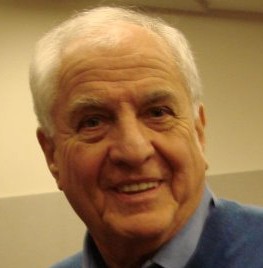
Or is it all downhill from here? Have I jumped the shark?
On September 20, 1977 a TV show gave birth to an idiom that now describes the downward spiral many face: jumping the shark. It was the fifth season premier of Happy Days when Henry Winkler’s character, Fonzie, ramp jumps with waterskis over a shark. Fans and critics feel that marked the impending decline of Happy Days.
Garry Marshall the creator of Happy Days has been asked if he feels offended by the phrase:
It was certainly not one of the shows I am most proud of. But I love the phrase jumping the shark and the way people use it today to signify a TV series nearing the end of its run.
Garry passed away this week at the age of 81. He had a prolific career producing, writing, directing and acting in countless things you might not have even realized were Garry’s creations. The Odd Couple. Mork and Mindy. Princess Diaries. Valentine’s Day.
Young or old, you’ve probably seen his work. Or know the people he’s discovered like Julia Roberts at 20 years old when he cast her for his movie Pretty Woman.
And I think Garry’s perspective on the often used expression to describe when projects die, companies go off the rails, or people lose their mojo is actually a lens into one of the most important things that led to Garry’s success, and something we can use to improve our own lives.
We all have a voice in our heads. Sometimes it’s friendly and helpful, and sometimes it’s mean and hurtful. Andrew Lane, Director of the Research Centre for Sport Exercise Performance at the University of Wolverhampton, wanted to find out more about this self-talk and other psychological skills.
Can we self-talk ourselves to better outcomes?
So Andrew teamed up with BBC Lab UK to complete a study with an astounding number of participants. 44,742 people performed an online game in which they were given a 6 × 6 grid scrambled with numbers ranging from 1–36. The task was to click 1–36 in sequence as fast as they could.
During the experiment some groups of people were given interventions. They were coached to use self-talk, imagery, or other psychological instructions to encourage improvement.
Andrew found one thing that won’t surprise you. People got better after a practice round. Makes sense.
But where Andrew was surprised was at how effective using motivational self-talk was, especially when it was focused on outcome or process (“I can beat my previous score”, “I can react quicker this time”) rather than instruction or emotion (“I will focus completely” or “I will stay calm”).
In other words: “I can do better”, a simple yet motivational statement, drove the most improvement during a task that requires endurance and competition.
I can do better.
That’s a really interesting expression to me. For two reasons.
One, it’s a critical outlook of your past. You aren’t over confident that everything you’ve touched is gold. That everyone else is to blame for your mistakes. Your entire past can be improved on.
You see that with Garry. You see it in how he handles the Shark Jumping phrase. No excuses, just:
It was certainly not one of the shows I am most proud of.
He even admits in his autobiography that Happy Days started phoning it in. And you see it through his whole life. His autobiography is full of anecdotes like Mary Tyler Moore throwing his first script at his head. It wasn’t good enough. He rewrote it. Lucy of I Love Lucy wrote “THIS IS SHIT” on his first script for her. He rewrote it until she loved it. His very first TV show was canceled:
But I knew from that experience there was no need to dwell. We just had to write and rewrite something new.
Rewrite, rewrite, rewrite. First time, second time, whatever. It can get better.
His first TV show that he owned and produced was a complete flop:
Then, the final ratings came out; we were ninety-ninth out of a hundred shows. I clipped the ratings from the newspaper and kept them in my wallet to remind myself that I had no place to go but up.
Eventually Garry wanted to move to the director’s chair. That wasn’t working either.
One day I was feeling way out of my league. A scene was not working and I didn’t know what to do. I told the crew that I was going for a quick walk. On that walk I realized something significant: I was not going to be able to show my cast and crew what a great director I was because the reality was that I was not a great director. I was a director with the best intentions, but I was not even a good director yet.
Garry didn’t have an over inflated ego of where he was. He was 48 years old finally getting a chance at directing his first film. But he had the self reflection necessary to realize, he wasn’t even good yet.
The past can always be improved.
Garry had a sense of this since he was 5 years old when he got his first drum kit. He thought he and parents would be a band. He said:
My mom played the piano, and Dad played the saxophone badly. But that Christmas morning I remember we all played together and I thought it was the greatest day ever. We were a band, and I imagined us practicing and performing as a family band for years to come.
“Practicing” is a really interesting word choice there. Not just playing and performing together as a family for years. But getting better. He knew even as a youngster that his whole life in front of him would be about constantly getting better. He’d never be done getting better.
The second interesting aspect of “I can do better” is its confidence.
“I can do better” implies that you know you will eventually do better if given the chance. It’s not “I’ll try to do better”. It’s I’ve always gotten better at things that I kept pursuing. I always will. All evidence points to that.
Growing up, Garry and his family didn’t have a lot of money, and Garry was sick constantly. One day lying in bed with cold compresses all over his body, his mom got him up. She was in a play and couldn’t afford a babysitter. She had one choice: take him to her job and put him on stage so she could watch him there. But Garry wasn’t well enough to do any dancing on stage. She informed him he’d be sitting.
“In the dressing room?” I asked.
“No. Onstage. You’ll play the drums,” she said.
“But Ma, I just started the drums. You know I’m not very good yet.”
“Don’t worry. You’ll follow my lead on the piano,” she said. “You’re smart and quick. You’ll learn.”
So we would sit onstage and she would play the piano with one hand and pat me on the back with the other. That’s how I learned to keep a steady rhythm.
His Dad was the same way. There was never a moment they didn’t expect him to do what he was thrown into. When Garry was applying for the Army, his father told him to put down that he was a “cameraman”.
In reality Garry was a writer and journalist, but his Dad saw a future in TV, and encouraged Garry to stretch his experience hoping Garry would get a TV job with the Army.
I guess he also had confidence that I was smart enough to learn how to be a cameraman on the fly.
Both his parents and his writing partner saw an infinite amount of potential in Garry. Not because Garry was some kind of phenom. They just knew that’s how people are. We never stop growing. Put us into any situation and we have the potential to get better.
Garry brought this optimism to the people he cast too. Hollywood is notorious for casting the exact right person with the right look, voice, cadence, you name it for the part. But Garry didn’t look for perfect people who already looked the part. During Henry Winkler’s audition for Fonzie:
I remember he was not at all the type of actor I was looking for. I thought I wanted a tall, handsome blond, and in walked a short, dark-haired actor from Emerson College and the Yale School of Drama. But before I could dismiss him, I hired him. His audition taught me something. Casting isn’t always about what you’re looking for. Sometimes it is about recognizing potential and what is standing in front of you.
Henry wasn’t Fonzie. But Garry knew Henry could become Fonzie. He had the potential. He saw it in the actors he cast and he saw it in himself.
I’m involved in one of the toughest projects of my life. It’s much harder than I thought it was going to be. Sometimes I feel like I won’t be able to fix the things I need to fix. But Garry’s an inspiration to remember how important my own self-talk is. Am I beating myself up and accusing myself of jumping the shark. Or am I reminding myself I can do better. I know I can improve everything I’ve done. I see that. Everything I’ve come up with deserves another rewrite and chance. And I also know that I’ve gotten better at life from 0 years old to now. All evidence points to that continuing. I’ll get better at every single thing that’s important to getting my projects, life, and creativity sorted out. I know I can do better.
What I haven’t figured out is why some people face adversity and quit or stop trying, while others pick themselves up and go on time after time. Is it genetics, environment, encouragement? I have been whacked often by comedians, stars, censors, studio executives, and, of course, the critics. The critics have whacked me for so long that now sons and daughters of critics are whacking me. However, each time I feel like I can do better.
Garry Marshall
P.S. If you enjoyed this article, please help spread it by clicking that ❤ below. And if you are interested in more you should follow my YouTube channel, where I share more about how history, psychology, and science can help us make better decisions.



